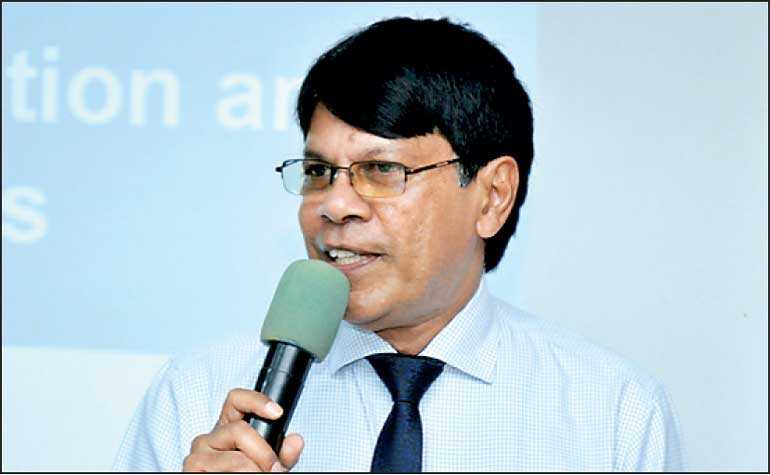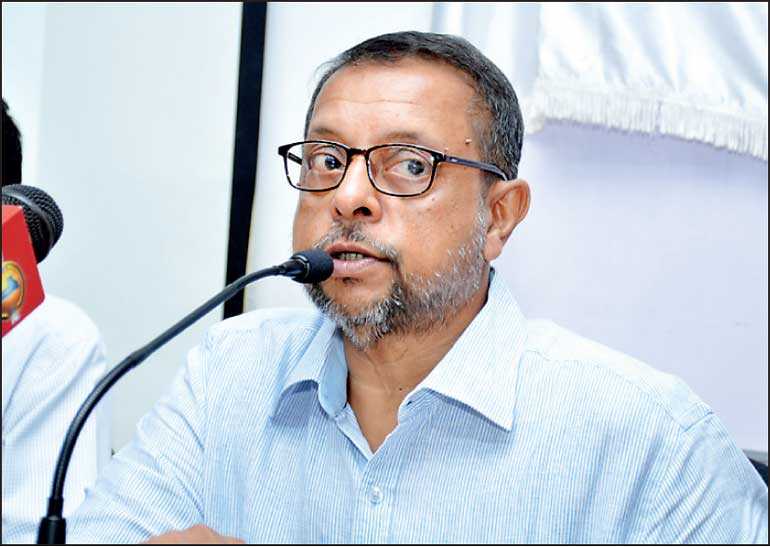Wednesday Feb 25, 2026
Wednesday Feb 25, 2026
Friday, 2 August 2019 00:00 - - {{hitsCtrl.values.hits}}


By Fathima Riznaz Hafi
When we hear the word ‘malnutrition’, we tend to associate it only with a lack of nutrients and also see it as something only poor people or underdeveloped countries experience. On the contrary, people who ‘seemingly’ eat well, and wealthy people in developed nations where good food is in abundance, can also suffer from it. How so? It’s because malnutrition does not only refer to insufficient consumption of nutrients but also the excess of it or imbalanced proportions – therefore it can affect both the rich and the poor.
“Malnutrition refers to both undernutrition and overnutrition. It refers to deficiencies, excesses or imbalances in a person’s intake of food (energy and/or nutrients) – getting too much or too little of certain nutrients, and it affects one in three people around the world,” says Food and Agriculture Organisation of the United Nations Assistant FAO Representative (Program) Dr. D.B.T. Wijeratne.
Dr. Wijeratne was speaking at a seminar on ‘Understanding nutrition and the food system’, organised by the Press Complaints Commission of Sri Lanka (PCCSL) and UN-FAO at the Sri Lanka Press Institute premises recently. Also present at the seminar were PCCSL CEO Sukumar Rockwood and National Media and Communications Consultant FAO Representative in Sri Lanka Mahina Bongso.
“A balance is important. Imbalances occur when one of the main components – protein, carbohydrates, fat or micronutrients (vitamins or nutrients) – is missing in the system. It is very complicated in the human body because if one of these elements is missing, your growth or health will be affected.
“For example, if Vitamin B12 is not there in the diet (you need this vitamin almost every day in your diet because it’s water-soluble), if there is deficiency for a couple of days or weeks, you can survive but if it is not there for a long period, iron absorption will be affected, or if you take a lot of calcium with iron, iron absorption will be affected; so there will be imbalances very easily,” he said, adding that nutrition requirements can change according to our age.
Malnutrition
Malnutrition comes in three categories: ‘Undernutrition’, ‘micronutrient deficiencies’, and ‘overweight and obesity’. Dr. Wijeratne presented a brief explanation of the three types of malnutrition:
Undernutrition
This means not getting enough; there is insufficient intake of energy and nutrients. Dr. Wijeratne reiterated here that the term undernutrition cannot be used synonymously with malnutrition, as the term malnutrition refers to both undernutrition and overnutrition. He further mentioned that there are different stages of undernutrition: ‘wasting’ (low weight for one’s height), ‘’stunting’ (low height for one’s age), and ‘underweight’ (low weight for one’s age), all of which pose health problems.
Dr. Wijeratne mentioned the Global Hunger Index, which is a tool designed to measure and track hunger at global, regional and national levels. It is calculated every year by an international organisation. “Sri Lanka ranks 67th out of 119 in the 2018 Global Hunger Index, which is good as we are at a moderate level but it’s best if we were No. 1,” he said and added, “One reason we are at that level is our child mortality rate is low but the problem is child ‘wasting’ has not improved in the last couple of years. Earlier we held a worse ranking, as we were at a higher number – now we are at the 67th place – it is getting better but we have to tackle child wasting.”
Micronutrient deficiencies
Micronutrients (vitamins and minerals) enable the body to produce enzymes, hormones, and other substances that are essential for proper growth, disease prevention and well-being. Inadequate consumption of micronutrients such as iron, iodine, vitamin A, folate and zinc can have devastating consequences.
Dr. Wijeratne mentioned that Sri Lankans tend to fill their plates with larger servings of rice and a very small serving of vegetables though there is a wide variety of vegetables produced locally. He also advised that when prices of certain vegetables increase, consumers should not deprive themselves by refraining from buying these vegetables and should instead opt for cheaper substitutes. For example, if a particular leafy vegetable that is rich in iron is not affordable, opt for ‘murunga’ which is cheaper and yet high in iron, he said.
Overweight and obesity
A person who is too heavy for his or her height is either overweight or obese – the outcome of an imbalance between energy consumed and energy expended. The excess in food intake (particularly food high in sugar and fats) combined with insufficient physical activity results in abnormal and excessive fat accumulation, which can impair health.
In Sri Lanka the tendency lays more towards being overweight than obese, Dr. Wijeratne noted, but that is no reason to be complacent as being overweight is causing many non-communicable diseases in the country, such as diabetes and heart disease.
“The solution is to change our food habits and lifestyles. We have so many excuses but the way we eat and our lifestyle determine our Body Mass Index,” he said.
Burden of malnutrition
Some countries experience only one form of malnutrition (single burden malnutrition), some experience two types of malnutrition that co-exist (double burden malnutrition) and some experience the existence of all three forms of malnutrition (triple burden malnutrition).
“Australia is experiencing single burden malnutrition – overweight and obesity (overweight and obesity go together as one burden), while in Sri Lanka it is both – undernutrition, and overweight and obesity – that’s double burden malnutrition,” he said.
Food habits
In tackling malnutrition food habits play a major role. Shifting the focus on to our dietary patterns, which can have beneficial or detrimental effects on our body, Dr. Wijeratne noted, “Sri Lankans tend to avoid breakfast (the most important meal) and then go for a heavy dinner; also, they tend to have dinner really late, even as late at 10 o’clock. This is bad practice because the body has an innate mechanism – it knows that if we usually go to sleep at 10 o’clock, we don’t need much energy after that time so it stores everything at 10 o’clock irrelevant of our activities. When we eat a heavy meal and then sleep, energy gets stored in the liver as glycogen and gets converted into fat. As a result, we end up with high triglycerides and over time we develop non-communicable diseases. To prevent this, it is best that we eat dinner as early as possible.”
He further said, “In the human body food is absorbed in different stages but it is not always absorbable. An example is iron, which most of the time, in plant sources, stays in a chelated form (mixed with phytates) making it difficult for the human body to absorb.” Certain food habits may further hinder absorption of iron and other nutrients. For example, tea, though a healthy beverage, can have undesirable effects if consumed with our meals or soon after.
“Avoid drinking tea along with your food because tea contains a lot of phytates, which chelates iron making it unabsorbable. Also, avoid eating fruits as dessert. It is best to eat fruits half an hour before the meal. When we eat fruit after the meal it gets fermented,” he explained.
Functional foods
Dr. Wijeratne shared some useful information on ‘functional foods’, which are fortunately easily found in Sri Lanka. Functional foods deliver enhanced benefits on our health that go beyond basic nutrition. They promote optimal health and can help reduce the risk of certain diseases. “Food is mainly for nutrition but then some foods provide beyond nutrition – it’s not only energy, carbohydrates, proteins, vitamins and minerals,” he said.
Bringing two examples from Sri Lanka, he mentioned ‘gotukola’ and ‘goraka’. “Gotukola has two triterpenoids. It has been clinically proven in the US that those triterpenoids can improve our short-term memory. In the West, gotukola is not available so it is dehydrated, made into powder and then consumed as tablets. A person needs around two tablets to get the required intake; two tablets are equivalent to around 20 g of fresh gotukola and that quantity of fresh gotukola is not a big issue to Sri Lankans but we never pay attention to that,” he said.
“The other food is ‘goraka’; its hydroxycitric acid inhibits the fat-making process. Your energy gets stored in the liver as glycogen, when it is there in the system your blood is always supplied with enough energy so you don’t feel hungry and therefore you don’t overeat and your food doesn’t get converted into fat. That’s why goraka is so expensive right now; its value as a functional food has been proven and companies extract the hydroxycitric acid to export it.
“Another functional food is chocolate. It has a fatty acid which contributes to a person’s feelings of happiness. But you will have to go for dark chocolate because that contains fatty acid. It creates serotonin in your brain and keeps you happy. Unlike milk chocolate which has as its main ingredients – sugar, cocoa mass and cocoa butter and is therefore unsafe to be eaten by diabetics, dark chocolate is safer as it contains at least 85% cocoa mass,” he added.
Dr. Wijeratne noted that we are fortunate to have functional foods easily accessible in Sri Lanka while other countries have to import the powder from here, upon learning about the benefits they carry; however we continue to ignore what’s in front of us. He advises that we make use of our local produce, improve our dietary patterns, consume in moderation and not deprive ourselves from eating healthy vegetables. “If prices are high – choose a cheaper substitute – we have plenty,” he reiterated.
Pix by Lasantha Kumara